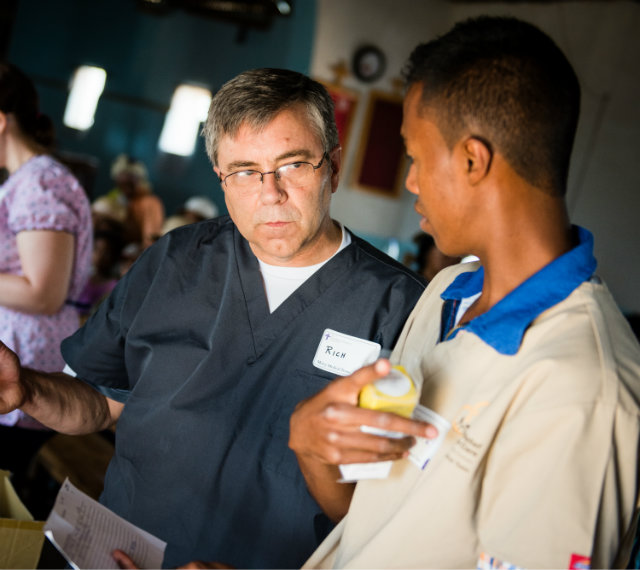Since 2006, LCMS Mercy Medical Teams have provided desperately needed healthcare and education to thousands of our brothers and sisters around the world. Our teams have served in Africa, Asia, Latin and South America, and Europe. Team members have come from all over the United States, and from all walks of life. We’ve had volunteers ages 18 to 82, and all ages in between. In addition to our dedicated medical volunteers—doctors, nurses, paramedics, dentists, and many more—hundreds of laypeople have served with us as well. There have been business people, teachers, construction workers, students, and even the mayor of a city on past trips. The only thing that all of our volunteers have in common is the desire to serve God’s hurting people, wherever they can be found.
One of the best parts of my position is talking to our volunteers after they return home, and hearing how their time on a MMT has impacted their life. Almost every time, the two words that I hear are “life changing.” Service on a Mercy Medical Team changes the way our volunteers see themselves, their place in God’s family, and their work. They recognize that their career is more than a job; it is the vocation in which God has placed them to serve.
The need for healthcare and education internationally is enormous, and the MMT program will continue to walk alongside our international partners to help meet this need. However, that same need exists right here in the United States as well.
The LCMS has recently placed its first domestic missionaries. This exciting development got us here at LCMS Mercy Medical Teams thinking–can’t we walk alongside of these new domestic partners in the same way that we do our international missionaries? Isn’t the need here at home just as great as it is in other countries?
After prayer and planning, our answer is an emphatic YES! Yes, the need is great in the United States, and yes, we can use the same model that we use internationally to serve our brothers and sisters here at home. We are currently planning the first domestic MMT in Philadelphia, PA, for this August.
While the model is the same, you will see some differences in our domestic work. Internationally, we often provide clinical care: seeing patients, making diagnoses, and prescribing medication. That’s not possible at this time domestically. There are many rules and regulations for doctors and nurses working within the United States, and the legalities are overwhelming. Right now, we are concentrating on providing Community Health Education (CHE) to our domestic partners, giving them information and knowledge tailored to fit the neighborhoods in which they live.
This looks different in different places. Each community has unique needs, and different challenges. CHE is flexible, and allows the residents of the community to identify the needs that they face. It wouldn’t be helpful for us to come and teach the residents of Philadelphia about malaria prevention, but we can certainly talk about heart attack and stroke, or diabetes, or healthy relationships, or prenatal care, or whatever else the neighborhood has identified as a challenge in the community.
A great benefit of CHE is that it is reproducible—the area Lutheran church can continue to engage the community long after the team leaves. As part of every domestic trip, we will be teaching the local congregation how to provide CHE, so that as other challenges are identified in their neighborhood, the church has the tools to address them.
Working domestically reduces the expenses for our volunteers. Our international team members often save for months, or even years, to finance a trip with us. Right now the airfare from my house to Philadelphia is about $2000 less than it is to Madagascar. We hope that people who long to bring health and education to the body of Christ but lack the financial resources to do so on an international scale will be able to serve domestically with us in the future.
Our trip to Philadelphia in August is a pilot program to identify the best practices for providing CHE in a domestic setting. Our host congregation serves a neighborhood in which many different languages are spoken. Families are struggling financially and spiritually. What an opportunity to bring people together in the name of Christ! With God’s help, we hope that this trip is a success, and leads to more opportunities to serve the body of Christ within our own borders.
If you are interested in serving domestically or internationally with the Mercy Medical Team program, I’d love to talk about it. Email me at tracy.quaethem@lcms.org.
